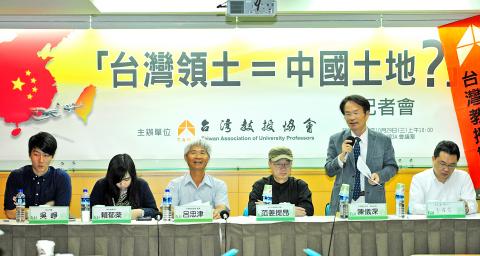Several groups yesterday panned Chinese Nationalist Party (KMT) Legislator Wu Yu-sheng (吳育昇) for saying that inviting the Dalai Lama to visit Taiwan would be the same as inviting him to visit China because Taiwan is part of China.
“Wu Yu-sheng’s remarks show that the Chinese Nationalist Party’s [KMT] insistence on the [so-called] ‘1992 consensus’ is a deception,” Democracy Tautin spokesperson Wu Cheng (吳崢) told a Taipei news press conference sponsored by the Taiwan Association of University Professors.
“If the KMT truly believes in the ‘1992 consensus,’ it would have nothing to worry about in inviting the Dalai Lama to visit the Republic of China [ROC], because the ROC has never banned the Tibetan spiritual leader from visiting, and we do not have to worry about how the People’s Republic of China [PRC] would react,” Wu Cheng said.

Photo: Lo Pei-der, Taipei Times
Wu Cheng was referring to a consensus allegedly produced during the 1992 cross-strait talks held in Singapore, which says that both sides of the Taiwan Strait believe that there is only one China, with each side having its own interpretation of what “China” means.
In 2006, then-KMT lawmaker Su Chi (蘇起) said that he had simply made up the term in 2000, when he was head of the Mainland Affairs Council.
Although the KMT has said that it is the only political party that can handle cross-strait relations, Wu Yu-sheng’s remarks show that China actually has the final say on cross-strait ties, Wu Cheng said.
“Voters in Taiwan should never vote for a candidate who advocates a ‘one China’ policy,” he said.
Northern Taiwan Society member Christian Fan Jiang (范姜提昂) said it was likely that Wu Yu-sheng’s target audience was in Beijing, not Taiwanese.
“Wu Yu-sheng’s remarks came after Mongolian and Tibetan Affairs Commission Minister Tsai Yu-ling (蔡玉玲) said Taiwan would welcome a visit by the Dalai Lama,” Fan Jiang said. “Tsai’s comment may have upset Beijing, so Wu Yu-sheng had to say something to make up for it.”
“If a visit by the Dalai Lama to Taiwan is the same as a visit by him to China, could we say that the arrival of the People’s Liberation Army would not be a big deal because it would only be coming to China?” Fan Jiang said.

SHIPS, TRAINS AND AUTOMOBILES: The ministry has announced changes to varied transportation industries taking effect soon, with a number of effects for passengers Beginning next month, the post office is canceling signature upon delivery and written inquiry services for international registered small packets in accordance with the new policy of the Universal Postal Union, the Ministry of Transportation and Communications said yesterday. The new policy does not apply to packets that are to be delivered to China, the ministry said. Senders of international registered small packets would receive a NT$10 rebate on postage if the packets are sent from Jan. 1 to March 31, it added. The ministry said that three other policies are also scheduled to take effect next month. International cruise ship operators

NUMBERS IMBALANCE: More than 4 million Taiwanese have visited China this year, while only about half a million Chinese have visited here Beijing has yet to respond to Taiwan’s requests for negotiation over matters related to the recovery of cross-strait tourism, the Tourism Administration said yesterday. Taiwan’s tourism authority issued the statement after Chinese-language daily the China Times reported yesterday that the government’s policy of banning group tours to China does not stop Taiwanese from visiting the country. As of October, more than 4.2 million had traveled to China this year, exceeding last year. Beijing estimated the number of Taiwanese tourists in China could reach 4.5 million this year. By contrast, only 500,000 Chinese tourists are expected in Taiwan, the report said. The report

HORROR STORIES: One victim recounted not realizing they had been stabbed and seeing people bleeding, while another recalled breaking down in tears after fleeing A man on Friday died after he tried to fight the knife-wielding suspect who went on a stabbing spree near two of Taipei’s busiest metro stations, Taipei Mayor Chiang Wan-an (蔣萬安) said. The 57-year-old man, identified by his family name, Yu (余), encountered the suspect at Exit M7 of Taipei Main Station and immediately tried to stop him, but was fatally wounded and later died, Chiang said, calling the incident “heartbreaking.” Yu’s family would receive at least NT$5 million (US$158,584) in compensation through the Taipei Rapid Transit Corp’s (TRTC) insurance coverage, he said after convening an emergency security response meeting yesterday morning. National

The Forestry and Nature Conservation Agency yesterday launched a gift box to market honey “certified by a Formosan black bear” in appreciation of a beekeeper’s amicable interaction with a honey-thieving bear. Beekeeper Chih Ming-chen (池明鎮) in January inspected his bee farm in Hualien County’s Jhuosi Township (卓溪) and found that more than 20 beehives had been destroyed and many hives were eaten, with bear droppings and paw prints near the destroyed hives, the agency said. Chih returned to the farm to move the remaining beehives away that evening when he encountered a Formosan black bear only 20m away, the agency said. The bear